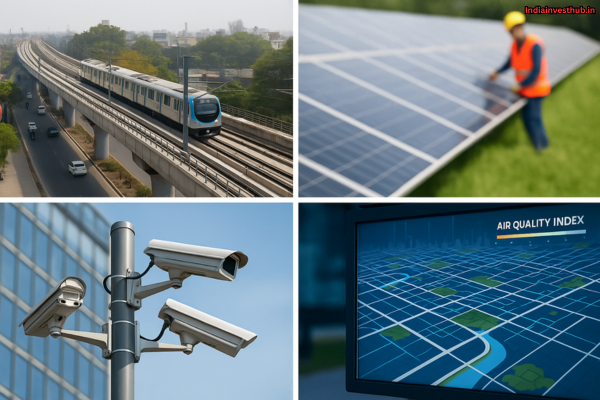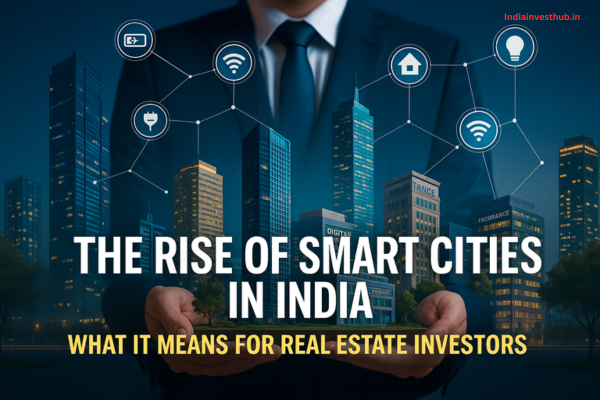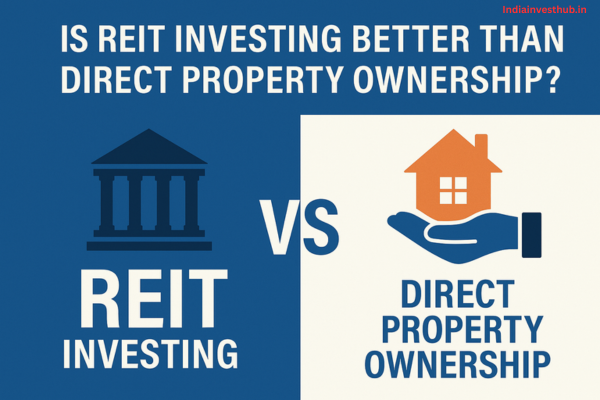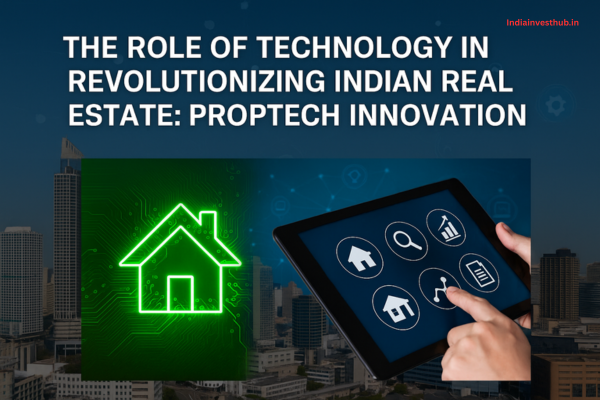Smart Cities in India are moving from policy slides to real, on-ground city transformation — and for investors watching long-term trends, the momentum is shifting fast. With billions flowing into digital infrastructure, integrated mobility, green energy, and tech-enabled governance, urban living is changing. That change isn’t just about comfort or convenience — it is signaling new zones of real estate opportunity.
The Smart Cities Mission has sanctioned development of 100 cities under multiple phases, with a total investment of ₹2.05 lakh crore approved by the government. Out of this, ₹82,000 crore worth of projects have already been completed, and ₹1.2 lakh crore are under implementation as of late 2025. 81% of projects are grounded or completed, according to data from the Ministry of Housing and Urban Affairs.
If you’re an investor searching for high-potential real estate markets, the rise of smart cities means infrastructure-driven growth cycles, new commercial corridors, and urban demand expanding beyond traditional metros, offering potentially superior ROI over time.
Smart Cities Mission in India: What It Is and Why It Matters
Smart Cities in India were launched with a core objective: build urban spaces that use digital technology, clean energy, efficient mobility, and strong governance to enhance quality of life.
Instead of large centralized plans, each smart city proposed its city-level model, covering:
- Integrated mobility
- Smart water management
- Digital governance
- Urban safety systems
- Energy-efficient infrastructure
- Waste management innovation
- Green public spaces
- Technology-enabled citizen services
The goal was simple: turn cities into investment-ready ecosystems — where infrastructure complements economic growth.
Investors care because real estate values follow infrastructure. Cities with better transport, commercial districts, smart utilities, and predictable development patterns attract businesses, residents, and global capital faster.
How Smart Cities Are Transforming Urban Infrastructure:

Smart Cities in India are changing urban infrastructure in three major ways:
1. Mobility and Connectivity
Projects like Metro Rail, BRT corridors, electric buses, and integrated traffic management reduce travel time and open new development corridors.
Example:
- In Bengaluru, metro expansion has pushed demand into Peripheral Ring Road zones.
- In Pune, metro connectivity increased interest in Wakad, Hinjewadi, and Tathawade.
2. Digital Infrastructure
Wi-Fi zones, smart surveillance, integrated command centers, and online service delivery reduce friction — from property tax payments to building permissions — making real estate more transparent.
3. Urban Living Standards
Smart lighting, air-quality sensors, sustainable drainage, green spaces, and solid waste management improve livability scores — a key factor for long-term property value.
Key Pillars of Smart Cities: Mobility, Energy, Governance & Sustainability
Smart Cities in India rest on four core pillars that matter for investors:
🅐 Mobility
When mobility improves, people move, businesses expand, and property prices lift along new corridors.
🅑 Smart Energy
Smart grids, rooftop solar, energy-efficient buildings, and electric charging infrastructure lower utility costs, improving commercial lease attractiveness.
🅒 Digital Governance
Transparent land records, digital building approvals, and online taxation reduce corruption and investment risk — especially for NRIs and institutional investors.
🅓 Sustainability
Green zones and walkable communities create higher livability, raising rent premiums in core smart districts.
Top Smart Cities Driving Real Estate Growth in 2026:
Several Smart Cities in India are emerging as investment hotspots, not just in concept but in actual market activity.
1. Pune
- Rising IT corridor + metro expansion
- Residential and commercial boom in Hinjewadi and Baner
2. Ahmedabad
- Multiple smart zones near GIFT City
- International financial center driving commercial leasing
3. Indore
- Ranked 1st in Smart City rankings
- Clean city brand + planned expansion
4. Surat
- Textile to diamond + new infrastructure corridors
- High GDP growth per capita
5. Kochi
- Smart port, metro, and IT parks
- Major FDI interest in marine technology
6. Jaipur
- Smart governance + tourism capital
- Affordable real estate with growth potential
7. Nagpur
- Metro + logistics hub
- EV manufacturing and MIHAN SEZ
Top 10 Locations for Real Estate Investment in India in 2026
These cities combine affordability today with infrastructure-driven appreciation tomorrow — a formula that investors look for.
Impact of Smart City Development on Property Prices and ROI:
Smart Cities in India tend to produce cluster-based development, where new projects rise around:
- Metro stations
- BRT corridors
- Smart governance zones
- SEZs and IT parks
- Port development areas
- Airport expansion zones
This creates micro-markets with:
- Rapid rental absorption
- Strong price appreciation
- Lower vacancy rates
CAGR in many smart-city corridors has already outperformed national metro averages. For example:
- Hinjewadi Phase III, Pune has seen ~11% YoY price increase in 2023-24.
- Indore smart zones saw 8–14% rise depending on micro-location trends in 2024.
Investors who enter before project completion often see significant upside once the infrastructure becomes operational.
Modern Infrastructure Projects Boosting Real Estate Demand:
Smart Cities in India benefit from parallel state and central projects:
- Metro rail networks
- Regional rapid transit systems
- Industrial corridors (DMIC, AKIC)
- Smart water and waste systems
- EV infrastructure networks
- Solar grid projects
- Smart command centers
- Multi-modal logistics parks
Each project reduces development risk and creates a predictable ROI pattern.
Commercial Real Estate Opportunities in Smart Cities:
Smart cities attract businesses. Businesses create commercial real estate demand, particularly in:
- Grade-A office stations
- Co-working spaces
- SEZ parks
- Retail high streets
- Mixed-use commercial complexes
- Industrial warehousing hubs
- Data centers
Commercial Real Estate in India: Trends and Future Outlook
For investors looking at steady rental yield, smart cities are promising because:
- They don’t have overheated pricing like big metros
- Leasing demand is rising
- Yields are typically higher (6–9%)
Residential Real Estate Trends in Smart Cities:
Residential demand in smart cities is rising due to:
- Better transport
- Young workforce migration
- Affordable pricing
- Hybrid work flexibility
- Modern living infrastructure
The 2BHK / 3BHK inventory, gated communities, and green-certified buildings are seeing fast absorption.
Rent yields in well-planned smart zones reach 3–4.8%, depending on location.
How Technology Is Enabling Smart City Real Estate:
Smart Cities in India are technology-centric by design.
They are powered by:
- IoT-powered smart electricity grids
- CCTV-based traffic flows
- Smart waste systems
- Air-quality control sensors
- Digital command centers
- GIS-based land planning
This data helps with predictive urban planning — making land use efficient, reducing congestion, and improving overall livability.
When cities are better planned, the real estate risk goes down, and investor certainty rises.
Government Policies & Incentives Supporting Smart City Real Estate Investment:
Smart Cities in India benefit from:
- FDI permit expansion
- Single-window clearance
- Digital land records
- Online building codes
- Tax benefits for green projects
- Faster approvals for certified developments
These reduce entry barriers for investors, particularly for NRIs and institutions looking to deploy capital in emerging cities.
FAQs – The Rise of Smart Cities in India
Q1: Do smart cities offer better ROI than big metros?
👉Yes — the combination of low entry price and infrastructure-driven growth means CAGR often outpaces saturated metros.
Q2: Are smart cities good for NRIs?
👉Yes — digital land records and transparency reduce legal risk.
Q3: Are smart cities only about IT zones?
👉No — they include logistics, healthcare, finance, mobility, energy, tourism, and governance reforms.
Q4: Do smart cities affect rental yields?
👉Yes — smart clusters near metro stations and SEZ parks see higher rental absorption.
Conclusion:
Smart Cities in India are not a fad — they are a structural shift in how urban development is planned and executed. For investors, that shift means emerging markets, better transparency, infrastructure-led appreciation, and wider investment choices beyond expensive metros. With multiple cities showing healthy momentum across commercial and residential segments, 2026 could be one of the most strategic years to participate in smart-city-led real estate growth.
Are you ready to explore which smart city aligns best with your real estate investment goals?





